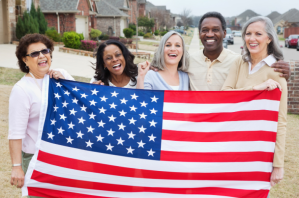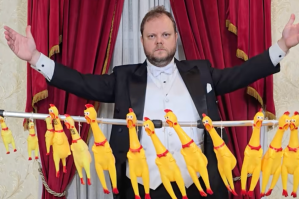In August of 1983, at the height of the international humanitarian crisis in the aftermath of the Vietnam War, my father leapt onto a boat headed for the Gulf of Thailand — an escape he had already attempted 10 times before.
“If we’d stopped, they would shoot,” my dad told my sisters and me, referring to the cảnh sát, or police. We looked at my mother, incredulous. She was nodding emphatically.
This tenth time, my father was lucky. Their boat managed to evade the Việt Cộng at every checkpoint; soon, they were out at sea. For two days, my father waited in the open waters that had already swallowed the lives of those brave enough to go before him. But again, he was lucky. Their crew was spotted by the knightly Chevalier, and the Frenchmen brought my father to safety at the Singaporean shore.
My father waited in a camp while Western deities deliberated his fate. Switzerland staked a claim, but he didn’t accept their offer; English was already difficult enough to learn, let alone German or French. Eventually, he was flown across the world and dropped off in Toronto, a cold, foreign city he would try his best to make his new home.
Like my father, I, too, have crossed continents and traveled far from home. At 20, filled with wanderlust, I embarked on a trip around the world. I visited a friend in Israel, toured ancient temple ruins in Myanmar, interpreted for doctors in Vietnam, interned at an NGO in Phnom Penh, partied in Siem Reap, partied some more in Koh Phangan, bathed in the Ganges river, practiced yoga at an ashram in Rishikesh, and taught English to monks in exile in Dharamshala. I went to many places far and foreign. I met new people, ate new foods, and learned new things.
But the circumstances that led to my travel, as opposed to my father’s, could not be more different.
My father, a Vietnamese army doctor turned political dissident, crossed the Pacific Ocean because he had no choice. My father traveled to escape a regime where enemies and academics were sent to ruthless “reeducation” (i.e. prison) camps. He had to leave behind his homeland, a country where kids walking home from school, including my mother growing up, knew to run into neighbors’ homes and hide under their beds when Cobra choppers and jet fighters and banana helicopters arrived overhead; rockets and grenades and explosives were about to be next.
Just one generation later, I had a powerful Canadian passport in my pocket and disposable income at hand. My travel was a choice.
One morning last year, I woke up and opened my laptop to see that an acquaintance — let’s call her Elizabeth — had posted on Facebook to encourage her virtual friends to seize the day and travel the world. Elizabeth, a recent American University graduate and a former sorority sister, was still high off a “transformative” trip to Indonesia earlier that year, a trip that mainly entailed hopping from one island to another, drinking cheap cocktails, and riding on exotic elephants (or at least, that’s what I gathered from her pictures). Life-changing indeed.
No one contested her point of view; an outpouring of likes and comments validated Elizabeth’s motivational status update. Even I found myself nodding my head in agreement. Change the world, and it’ll change you!
It’s so easy to forget that others may have had to make immense sacrifices to do something you’ve come to see not only as a rite of passage, but indeed, a right in itself.
Is travel a right? In the strictest legal sense of the word, I suppose you could argue “yes.” The right to mobility is enshrined in Article 13 of the Universal Declaration of Human Rights, which asserts that “everyone has the right to leave any country, including his own, and to return to his country.” In the United States, the freedom of movement is protected in the United States Constitution, and in the 1958 Kent v. Dulles decision, Justice William O. Douglas opined, “Travel abroad, like travel within the country … may be as close to the heart of the individual as the choice of what he eats, or wears, or reads. Freedom of movement is basic in our scheme of values.”
Everyone should have the right to travel, but, of course, that doesn’t hold up to reality.
For one, not everyone can afford it. My eight-month trip was paid for by two years of disposable income saved from my part-time campus job. Halfway through, I managed to squander all my own money, but I was lucky; my parents swooped in to finance the rest of my journey of self-discovery. Because of them, I was able to continue living my life-transforming, resume-padding life abroad. Thanks, Mom and Dad!
In any case, our carefully curated Instagram grids, full of lush Airbnb homes and landscapes with the ever-trendy “fade” filter applied, seldom mention how much the plane ticket to Byron Bay cost or who’s financing our Alternative Break to Myanmar (yes, my parents paid for that too). Instead, we use hashtags like #blessed, #wanderlust, and #35mmfilm and call it a day.
There’s also the opportunity cost of traveling. I wasn’t in a rush to start earning money, but many college students are. Over 70% of all “gappers” come from families whose parents have an estimated annual parental income of over $100,000. Case in point: At my ultra-altruistic, ultra-worldly, ultra-expensive alma mater, the average student’s family income is $107,753.
Besides the cost of travel, remember that this “right” is granted only to those who own an actual passport — and the nationality associated with your passport can determine whether foreign borders will invite you in or shut you out.
For many, the notion of traveling probably conjures up images of white sand beaches, modern skyscrapers, or pastel-colored colonial architecture as well as feelings of leisure, self-discovery, adventure, and hope.
But for millions of others, traveling comes with the credible fears of embarrassment, rejection, and even death.
According to various accounts, an estimated 200,000 to 400,000 Vietnamese boat people drowned at sea by the time the United Nations resettlement efforts ended in 1996. My father and his siblings were among the luckiest to have, quite literally, made it out alive.
Shortly after arriving in Canada, my penniless father (a doctor in Vietnam) went job hunting. An old family friend in Vietnam had told him to answer “yes” to every question in every interview. A pizzeria owner asked him if he knew how to make pizza, and my father, who had never seen a pizza before in his life, enthusiastically answered “yes.” He was hired and, needless to say, fired a couple days later. My mother, also a doctor back in Vietnam, humbly spent her first couple of years in Toronto working in an electronics factory.
When my mother and her family arrived in Toronto as sponsored immigrants, they were reunited with their siblings, who had weathered the trip by boat six years earlier. The family of seven spent the years shortly thereafter sharing a two bedroom apartment.
While the teenage kids passed their days in high school classrooms, the adults worked their way toward becoming doctors, pharmacists, and engineers again. Although most of their education and retraining was supported by scholarships and loans from the Canadian government, everyone worked long hours and extra shifts at factories and restaurants in order to make ends meet. At their jobs, they endured not only laborious pain, but constant discrimination as well.
As a medical resident, my mother was examining a young boy’s ear when his mother angrily eyed her and pulled her son away. The boy’s mother asked for the doctor, even after my mother had already introduced herself as the doctor. The woman then exclaimed that she wanted another doctor, and kept insisting until the attending physician — an older white man — came into the room and to my mother’s defense.
But my mother knew not to cause a scene and remained silent. In fact, my mother’s had a lot of practice with staying quiet and obedient; the sassy, mouthy woman I know now had learned very quickly back then to keep her head down and her mouth shut when the white folks volleyed racial insults at her from across the factory assembly hall.
Welcome to Canada, they said.
My parents came to Canada with nothing but the clothes they wore on their backs; when I traveled, not only did I carry a fancy Osprey backpack and a snazzy Nikon camera, but also access to Canadian embassies as well as the comfort of knowing that when I was bored with “finding myself,” I could always come home.
My father, on the other hand, relinquished his Vietnamese citizenship when he traveled to Canada. He believed in his heart that leaving meant saying goodbye to home forever.
With my perfect English and universally recognized North American accent, doors opened up to me on my travels that would have remained closed for others. “She’s American,” locals would exclaim to each other, wide-eyed, when I opened my mouth to speak. At first, I would try to tell them that I’m actually a Canadian studying in the United States, but it all got too confusing; anyway they didn’t really care about Canada, so after a while I just stopped trying.
Everywhere I went, people seemed to be obsessed with America.
I discovered that being treated like royalty isn’t uncommon when you’re a “Westerner” traveling abroad. Conversely, my parents’ accounts of hardship, discrimination, and sacrifice aren’t unusual for non-Western immigrants and refugees.
The next time you embark on a big adventure, remember that you carry much more than what’s in your bags. Remember that in your wallet, you carry the dollar, against which most other currencies in the world are matched. Your thin passports represent how lucky you are to travel visa-free to 166 countries. Your voice projects a widely recognized version of the world’s most universal language.
In light of today’s unfolding refugee crisis, remember that not everyone has your freedom of mobility.
This story first appeared on The Development Set and is reprinted here with permission. This is a shortened version of the original piece.

































